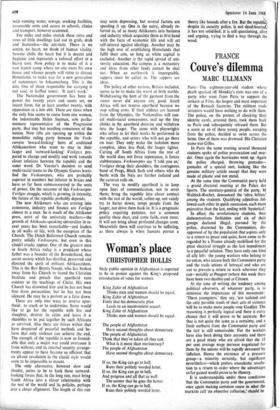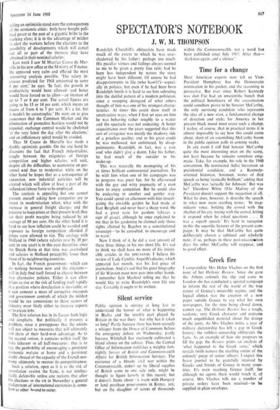Couve's dilemma
FRANCE MARC ULLMANN
Paris—The eighteen-year-old student whose death sparked off Monday's riots was one of a party who went from Paris to support the strikers at Flins, the largest and most important of the Renault factories. The militant trade unionists would have nothing to do with them. The police, on the pretext of checking their identity cards, arrested them, took them back to Paris and subsequently released them. But a score or so of these young people, escaping from the police, decided to swim across the Seine. One of them was drowned. His Christian name was Gilles.
In Paris the same evening several thousand students spoke of police provocation and mur- der. Once again the barricades went up. Again the police charged, throwing grenades— grenades of a special sort, looking like the genuine military article except that they were made of plastic and not metal.
At the same time the Communist party held a grand electoral meeting at the Palais des Sports. The secretary-general of the party, M Waldeck-Rochet, denounced the 'ultra leftists' among the students. Qualifying adjectives fol- lowed each other in quick succession, each more pejorative than the last, ending with 'hysterical.'
In effect, the revolutionary students, their dethonstrations forbidden and six of their groups declared illegal, pursued by the police, disowned by the Communists, dis- approved of by the populatiOn that aspires only to a return to peace and quiet, have come to be regarded by a France already mobilised for the great electoral struggle as the last impediment to a peaceful solution. They have only one kind of ally left : the young workers who belong to no union, who accuse both the Communist party and the trade unions of betrayal and who are out to prevent a return to work wherever they can—notably at Peugeot (where this week there have been two deaths) and at Citroen.
At the time of writing the tendency among political observers, of whatever party, is to minimise the importance of this movement: 'These youngsters,' they say, 'are isolated and the only possible result of their acts of violence will be to make more people vote Gaullist. The reasoning is perfectly logical and there is•every chance that it will prove to be accurate. But that is not quite the same as a certainty, and a fresh outburst from the Communist party and the COT is still conceivable. For the workers have also been doing their accounts and there are a good many who are afraid that the 13 pei cent average wage increase negotiated for them by the unions will be rapidly devoured by 'inflation. Hence the existence of a pressure group—a minority certainly, but significant nevertheless—which prefers anarchistic revolu- tion to a return to order where the advantages so far gained would prove to be illusory.
It is understandable under these conditions that the. Communist party and the government, once again making common cause in what the marxists call 'an objective collusion,' should be taking an optimistic stand over the consequences of the economic crisis: both have bought poli- tical peace at the cost of a gigantic bribe to the
orking class; it is to the advantage of neither to alert the workers before the elections to the possibility of developments which will cancel out all or part of the increase the's, have obtained in their nominal salaries.
Last week I saw M Maurice Couve de Mur- %ille in his new office at the Ministry of Finance.
He appeared very calm and offered the most reassuring analysis possible. 'The salary in- creases predicted for 1968 amounted to some 6 per cent,' he says. 'In fact, the growth in productivity would have allowed—and hence would have forced us to allow—an increase of up to 7 or 8 per cent. The actual figures are going to be 13 or 14 per cent, which means an excess of from 6 to 7 per cent. It's a lot, but it needn't be catastrophic.' He went on to give assurances that the Common Market and the elimination of protective barriers would not be impeded, exchange control would be abolished 'at the very latest the day after the elections,' and an inflationary spiral would be avoided.
Thus M Couve de Murville has made a doubly optimistic gamble. On the one hand he discounts the fact that French industrialists, caught between the exigencies of foreign competition and higher salaries, will seek, despite all the difficulties, to economise on per- sonnel and thus to modernise; while on the other hand he hopes that as a consequence of expansion, new industrial activities will be created which will allow at least a part of the redundant labour force to be employed.
The analysis is appealing but one cannot prevent oneself asking how companies are to invest in modernisation when, what with the increase in general freight charges and the pressure to keep prices at their present level, they see their profit margins being reduced by an average of 80 per cent. On the other hand it is hard to see how inflation could be avoided and exposure to foreign competition afforded if prices were allowed to rise. The analogy with Holland in 1960 (where salaries rose by 18 per cent in one year) is in this case deceptive, since the Dutch florin at that time was overvalued and salaries in Holland perceptibly lower than those of its neighbouring countries.
In fact. the French government—which can do nothing between now and the elections— will in July find itself forced to choose between two alternative policies. Either it can allow prices to rise at the risk of landing itself rapidly in a position where devaluation is inevitable; or it can concoct a mass of corrective measures and government controls of which the mildest would be tax concessions to those sectors of industry most likely either to increase exports or to create jobs.
The first solution has in its favour both logic and simplicity. But politically it presents a problem, since it presupposes that the unions will not object to measures that will ultimately tub them of their hard-won advantage. As to the second option, it contains within itself the risks inherent in all half-measures: that is to say, the probability of encouraging a persistent economic malaise at home and a persistent doubt abroad of the capacity of the French eco- nomy ultimately to recover its competitiveness.
Such a solution, open as it is to the risk of speculation against the franc, is not intellec- tually defensible unless one reckons that after the elections in the us in November a general realignment of international currencies is, some- how or other. hound to occur.











































 Previous page
Previous page